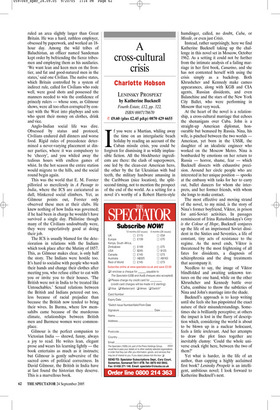A cross-cultural crisis
Charlotte Hobson
LENINSKY PROSPEKT by Katherine Bucknell Fourth Estate, £12, pp. 322, ISBN 0007178670 V £9.60 (plus £2.45 p&p) 0870 429 6655 If you were a Martian, whiling away the time on an intergalactic beach holiday by reading an account of the Cuban missile crisis, you could be forgiven for dismissing it as wildly implausible fiction. All the blockbuster ingredients are there: the clash of superpowers, one led by the clean-cut American hero, the other by the fat Ukrainian with bad teeth, the military hardware amassing in the Caribbean (nice location), the splitsecond timing, not to mention the prospect of the end of the world. As a setting for a novel it’s worthy of a Robert Harris-style humdinger, called, no doubt, Cuba, or Missile, or even just Crisis.
Instead, rather surprisingly, here we find Katherine Bucknell taking up the challenge in this novel set in Moscow, October 1962. As a setting it could not be further from the intimate analysis of a failing marriage in her first book, Canarino, and she has not contented herself with using the crisis simply as a backdrop. Both Khrushchev and Kennedy make cameo appearances, along with KGB and CIA agents, Russian dissidents, and even Balanchine and the stars of the New York City Ballet, who were performing in Moscow that very week.
At the heart of the novel is a relationship, a cross-cultural marriage that echoes the shenanigans over Cuba. John is a straight-up American diplomat, honourable but bemused by Russia. Nina, his wife, is pinched between the two worlds American, yet born in the USSR, the daughter of an idealistic engineer who worked on the Moscow Metro. Nina is bombarded by emotions on her return to Russia — horror, shame, fear — which Bucknell dissects with exhaustive precision. Around her circle people who are interested in her unique position — spooks at the embassy with tasks for her to carry out, ballet dancers for whom she interprets, and her former friends, with whom she longs to make contact.
The most effective and moving strand of the novel, to my mind, is the story of Nina’s former boyfriend, Viktor, in prison for anti-Soviet activities. In passages reminiscent of Irina Ratushinskaya’s Grey is the Colour of Hope, Bucknell conjures up the life of an imprisoned Soviet dissident in the Sixties and Seventies, a life of constant, tiny acts of resistance to the regime. As the novel ends, Viktor is threatened by the most frightening of all fates for dissidents, a diagnosis of schizophrenia and the drug treatments that accompany it.
Needless to say, the image of Viktor blindfolded and awaiting unknown tortures on the one hand, while on the other Khrushchev and Kennedy battle over Cuba, combine to throw the subtleties of Nina and John’s marriage into the shade.
Bucknell’s approach is to keep writing until she feels she has pinpointed the exact nature of their misunderstandings. Sometimes she is brilliantly perceptive; at others the impact is lost in the flurry of description which, considering the world is about to be blown up in a nuclear holocaust, feels a little irrelevant. And her attempts to draw the plot lines together are inevitably clumsy: ‘Could the whole universe crack right here, between the two of them?’ Yet what is harder, in the life of an author, than capping a highly acclaimed first book? Leninsky Prospekt is an intelligent, ambitious novel; I look forward to Katherine Bucknell’s next.
































































 Previous page
Previous page